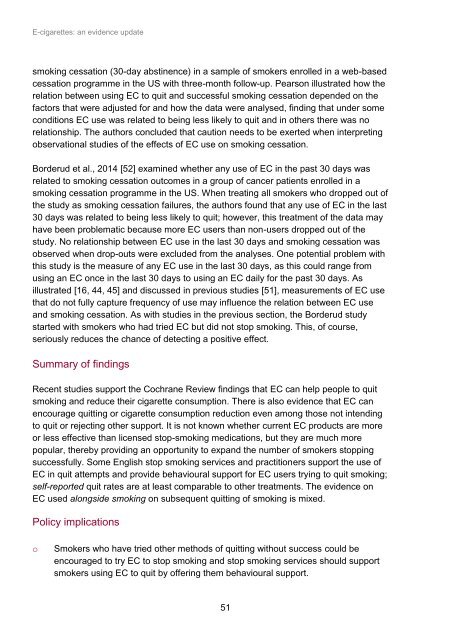E-cigarettes an evidence update A report commissioned by Public Health England
3nOaxpIe4
3nOaxpIe4
You also want an ePaper? Increase the reach of your titles
YUMPU automatically turns print PDFs into web optimized ePapers that Google loves.
E-<strong>cigarettes</strong>: <strong>an</strong> <strong>evidence</strong> <strong>update</strong>smoking cessation (30-day abstinence) in a sample of smokers enrolled in a web-basedcessation programme in the US with three-month follow-up. Pearson illustrated how therelation between using EC to quit <strong>an</strong>d successful smoking cessation depended on thefactors that were adjusted for <strong>an</strong>d how the data were <strong>an</strong>alysed, finding that under someconditions EC use was related to being less likely to quit <strong>an</strong>d in others there was norelationship. The authors concluded that caution needs to be exerted when interpretingobservational studies of the effects of EC use on smoking cessation.Borderud et al., 2014 [52] examined whether <strong>an</strong>y use of EC in the past 30 days wasrelated to smoking cessation outcomes in a group of c<strong>an</strong>cer patients enrolled in asmoking cessation programme in the US. When treating all smokers who dropped out ofthe study as smoking cessation failures, the authors found that <strong>an</strong>y use of EC in the last30 days was related to being less likely to quit; however, this treatment of the data mayhave been problematic because more EC users th<strong>an</strong> non-users dropped out of thestudy. No relationship between EC use in the last 30 days <strong>an</strong>d smoking cessation wasobserved when drop-outs were excluded from the <strong>an</strong>alyses. One potential problem withthis study is the measure of <strong>an</strong>y EC use in the last 30 days, as this could r<strong>an</strong>ge fromusing <strong>an</strong> EC once in the last 30 days to using <strong>an</strong> EC daily for the past 30 days. Asillustrated [16, 44, 45] <strong>an</strong>d discussed in previous studies [51], measurements of EC usethat do not fully capture frequency of use may influence the relation between EC use<strong>an</strong>d smoking cessation. As with studies in the previous section, the Borderud studystarted with smokers who had tried EC but did not stop smoking. This, of course,seriously reduces the ch<strong>an</strong>ce of detecting a positive effect.Summary of findingsRecent studies support the Cochr<strong>an</strong>e Review findings that EC c<strong>an</strong> help people to quitsmoking <strong>an</strong>d reduce their cigarette consumption. There is also <strong>evidence</strong> that EC c<strong>an</strong>encourage quitting or cigarette consumption reduction even among those not intendingto quit or rejecting other support. It is not known whether current EC products are moreor less effective th<strong>an</strong> licensed stop-smoking medications, but they are much morepopular, there<strong>by</strong> providing <strong>an</strong> opportunity to exp<strong>an</strong>d the number of smokers stoppingsuccessfully. Some English stop smoking services <strong>an</strong>d practitioners support the use ofEC in quit attempts <strong>an</strong>d provide behavioural support for EC users trying to quit smoking;self-<strong>report</strong>ed quit rates are at least comparable to other treatments. The <strong>evidence</strong> onEC used alongside smoking on subsequent quitting of smoking is mixed.Policy implicationsoSmokers who have tried other methods of quitting without success could beencouraged to try EC to stop smoking <strong>an</strong>d stop smoking services should supportsmokers using EC to quit <strong>by</strong> offering them behavioural support.51


